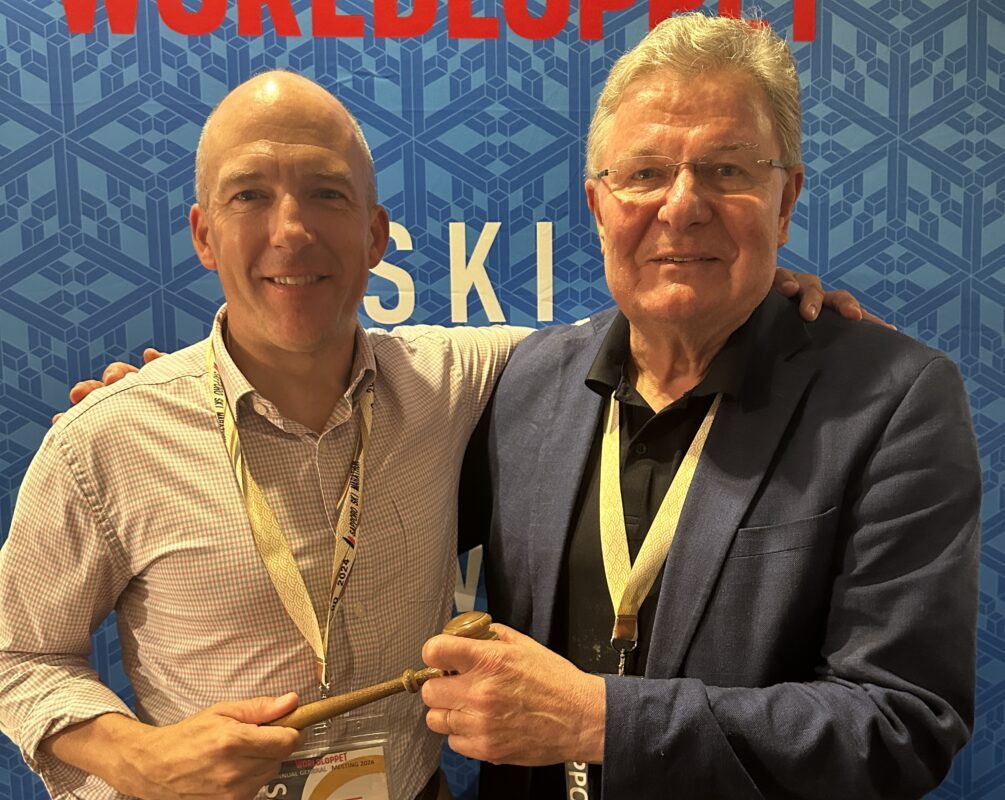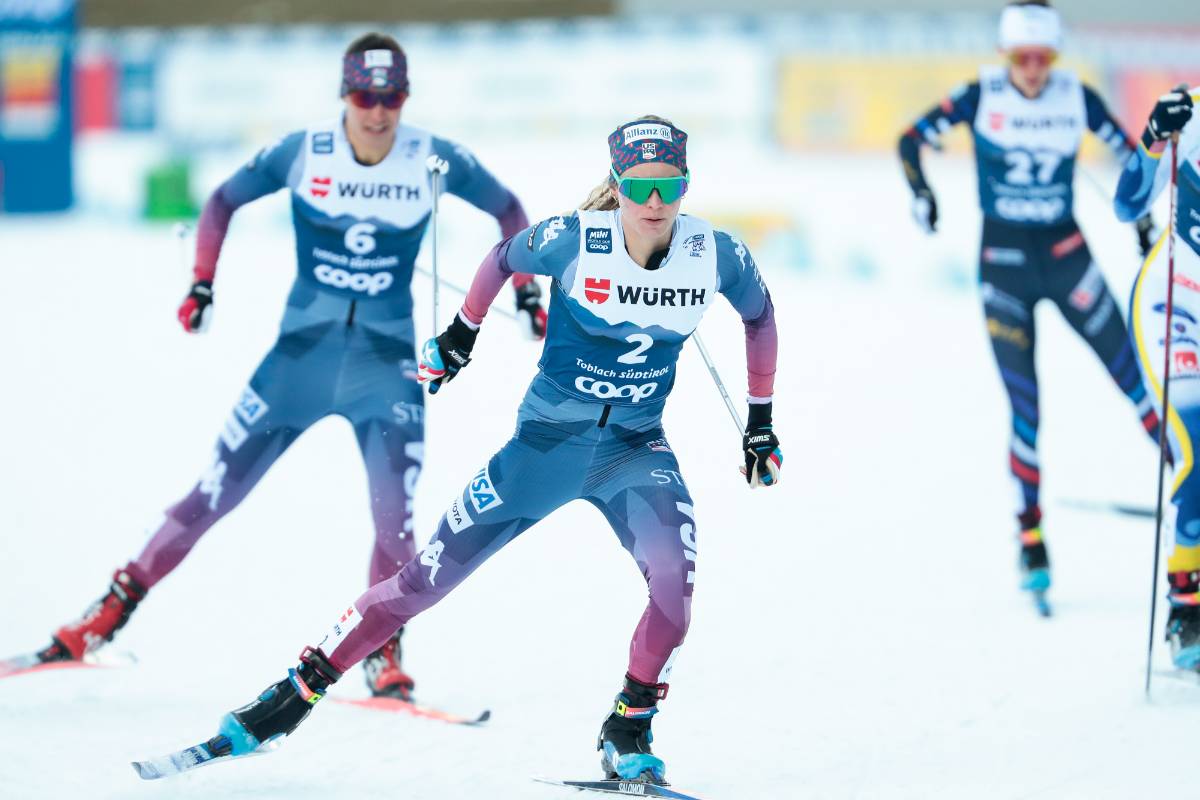
After a one-year hiatus, the Russian Sprint Tour is back, bringing a unique combination of events to elite spring ski racing.
First held in 2007, the event has twice been won by Justyna Kowalczyk (POL) and Emil Joensson (SWE), and has often featured a number of top World Cup skiers.
The 2012 edition consisted of two days of racing in Yugorsk, a small city of 35,000 on the western edge of Siberia.
After the 2011 event was cancelled due to funding issues, organizers came back with a set of races that will not be found on the World Cup calendar anytime soon.
The first day of competition, on Wednesday, belied the concept of a sprint.
Despite being held on a relatively flat, 1.2-kilometer course, the race was about endurance as much as speed.
Termed a double-pursuit, the event was actually what the International Ski Federation now considers a skiathlon, held in a sprint-style format.
All entrants started in semifinals, skiing two laps in one technique before switching to the other. In an added twist, half the field of twelve in each semi started in classic, with the other half taking to the line skating.
Both techniques were held on the same loop, with a single climb two-thirds of the way through.
While the likes of Kowalczyk and Joensson were not present this year, the hosts brought plenty of their own firepower, including Alexei Petukhov and Nikita Kriukov among others.
Top foreign skiers included Mathias Standvall (FIN), Federico Pellegrino (ITA), and Tim Tscharnke (GER).
The top six from each semi advanced to the final, where the lucky participants were given an extra lap in each technique, for a total of six loops measuring 7.2k of racing—on the heels of the 4.8k of the semis.
In the first semi the advantage went clearly to those skating the first half as five of the six skiers who moved on came from this group.
With just the single hill, many chose to double pole the classic portion on skate gear, though they were still required to swap equipment in the pit.

Through the first part of the loop on the gradual terrain, the classic skiers could stay close to the skaters, but once the inclines began, the gaps grew.
In the second semi, there was no advantage for either start group with three coming from each.
The B-final was won by Kazakhstan’s Denis Volotka after the initial skaters made the interesting choice of engaging in slower paced-tactics.
They did not open up a significant gap until the final lap, and were quickly consumed when they switched to classic.
In the A-final, Tcharnke took the race out hard in skating, quickly pulling his pack away from the classic skiers for a 10 second lead after the first loop.
They added another 14 seconds on the second lap, but the pace dropped the third time around, and the skaters only gained a few more seconds before the switch.
Their opponents halved the gap after the exchange, and with the exception of classic sprint specialist Kriukov, quickly reeled in Tscharnke and company.
Entering the final lap, classic and skate came together through the stadium, leaving little hope for those in the slower technique.
Andrey Parfenov attacked over the top of the last hill, opening a gap. Evgeny Belov (RUS) and Petukhov tried to follow, but were only able to stage a fight for second and third, with the veteran Petukhov coming back in the homestretch to take second.
While hill was somewhat chopped up, the skiing was generally firm and fast, with a small but enthusiastic crowd in the bleachers.

Day two made no more effort to honor ski racing convention with the SuperSprint Double Knockout added additional complexity.
While the technique was limited to only skating, each heat had two groups, starting at different points on the course.
With one set of five or six athletes on the homestretch and the other on the backstretch the scene was of one long start line with half the field facing the opposite direction.
This time around, the seemingly sadistic organizers had the racers ski three laps in the semifinals with the slowest two skiers eliminated each lap.
With the two different groups, the only way to ensure longevity was to ski hard from the start, and then max out a sprint in the final 100 meters, making for a grueling event, that got the better of many.
By the later laps some skiers, completely spent, were unable to do more than just ski in their final lap.
As on the previous day, the A and B finals added an additional lap for a total of four, making a furious five k with intermediate sprints every lap.
In the final rounds, skiers were resting at the completion of each lap, and tried to stay in by holding top position in their group at the end of the loop, rather than worrying about the other pack.
In the B-Final, Strandvall and Anton Gafarov lunged with one lap to go. Only one would stay alive, but with just inches separating the pair, organizers quickly reviewed the photo finish camera as the stadium announcer encouraged both men to keep racing.
Neither seemed overly enthusiastic to do so, and just seconds later, Gafarov was pulled, leaving the Finn as the sole remaining skier from his start group.
The sprint specialist had no hope of continuing for another lap, and he gracefully hopped off the course at the conclusion of his loop before halting and stopping recording on the helmet cam he wore throughout.
While the skiers clearly raced as hard as possible, suffering through the brutal format, the relaxed atmosphere of spring racing prevailed, with plenty of smiles, mugging for the television cameras, dancing to the Russian opera music on the stadium loudspeakers, and clearly enjoying the conclusion of a long season.
Mikhail Devjatiarov (RUS) took the victory on day two ahead of World Cup skier Dusan Kozisek (CZE), an apparent aficionado of alternative sprint racing—he is a regular on the Red Bull NordiX circuit…
Kazakh Nikolay Chebotko placed third, while Petukhov finished sixth, good enough to claim the overall Grand Prix Sprint Tour 2012 title.
Petukhov finished the Tour with 56 points, just two more than Sergey Turyshev, a Russian World Cup distance skier.
Belov was third with 52 points.
There was no women’s race this year, though the kids event, held between semifinals and finals, was fully televised, complete with live timing, splits and results.
Both days of racing are available to watch on the website of Russian Television station Yugra.
Neither race format falls into the category of “made for TV” as following two simultaneous groups of racers on course is difficult to say the least.
Adding to festivities was an attempt on the 100-meter speed record.
A new mark had been recently set in Norway by Timo Andre Bakken (NOR).
Gafarov knocked .1 seconds off the record, posting a time of 11.72 seconds prior to the start of the SuperSprint Double Knockout event.
“I could not believe at first that I could beat the world record,” Gafarov was quoted as saying on the SprintTour website. “But I had passion and a spirit to fight. It is also pleasant to break the world record in my native land, here in the Khanty-Mansiysk region, where I live with my family. My homeland has helped me.”
Overall Results (listed in the left column)
Editor’s Note: If you are hankering for some more ski racing, definitely check out the race video. The television broadcast is professionally produced, the level of skiing high, and the events totally wacky. You won’t see anything else like it!
Plus if you have read the above article, you can avoid the headache of trying to figure out what is actually going on…
Topher Sabot
Topher Sabot is the editor of FasterSkier.



